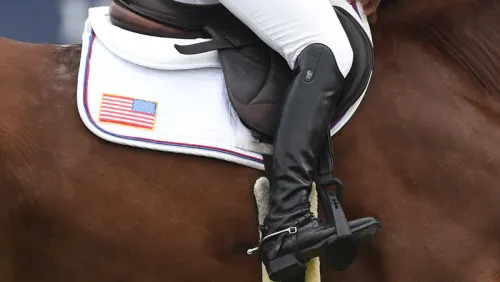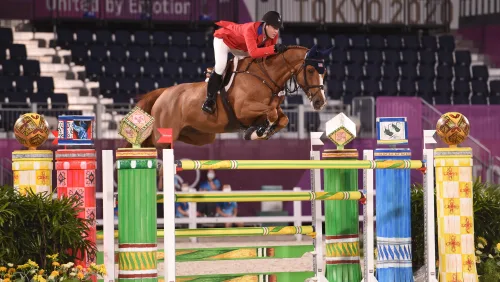When Penny Brennan rode into the ring at the Gulf Coast Magnolia Classic in Gulfport, Mississippi, for the $25,000 Purina Grand Prix in February, a bluebird swooped into the arena alongside her. It perched on the flag of the first jump until Brennan and her big gray mare Hells Angel jumped a clean round. It left with her, and it reappeared when Brennan returned for the jump-off. The bird went back to the spot on the flag and remained there until she finished as the winner of the class.
Thinking of it now, Brennan smiles. She likes to think that was her guardian angel watching over her because she’s sure she has one somewhere.
“I’m the girl who got struck by lightning and lived,” she tells people.

Penny Brennan riding Hells Angel during the Gulf Coast Winter Series (Miss.). Alison Hartwell Photos
In October 2019, Brennan had a full plate. She was living in California and riding 20 horses, a mix of her own and those owned by clients. Brennan and her boyfriend Jacob Nazarian had uprooted their lives on the East Coast, parted ways with their existing clients, and driven to California for this position.
Brennan, 49, is a lifelong horsewoman, hailing from Great Britain originally. She didn’t think twice when a groom asked her for help with a horse one day.
“I was in between rides, and the groom, who’s a very good groom, he asked me if I would hold the twitch while he clipped an ear, and I said ‘Sure,’ ” recalls Brennan. “I’m holding the twitch, and he handed me the lip chain too, and I’m like, ‘Wow, he gets a lip chain and a twitch.’ I’m holding the twitch, and he came to my side to clip the ear. I looked to my left to see where I could escape to in case the horse freaks out, and just then he leapt in the air and landed on my head. He had steel shoes on of course.”
The horse kicked Brennan in the face, breaking her nose. When his foot hit her, he knocked her against a 4”x4” post in the grooming area, splitting the back of her head open. As she was sprawled against the post, he kicked her twice more, breaking her ribs and hitting her in the head again.
Brennan remembers lying on a couch in the barn, and Nazarian scooping her up and running to his truck.
“I had blood coming out of my eyes, my ears, my nose, my mouth,” she says. “I should not have made it through this.”
She woke up briefly in a trauma unit, looking up at a bright overhead light.
ADVERTISEMENT
“I honestly thought I’d been abducted by aliens,” she says with a chuckle. “I had tunnel vision, and I couldn’t see anything, and they had me strapped down with tubes down my throat. I guess I shouldn’t have woke up at that point.”
Nazarian later told her that she hurled nurses across the room until they gave her a sedative and eventually put her in a medically induced coma.
“We’re not married, and she doesn’t have a medical proxy, so they basically told me I could stand outside and watch what was going on,” Nazarian says. “There were two security guards over there, and I said, ‘We can handle this two ways—you can make two rooms ready for them, or I can just quietly sit in the corner because I’m not leaving her side no matter what.’ ”
The next several weeks were a blur. Brennan had multiple rib, facial and skull fractures and underwent one surgery and spent a considerable period in the ICU, where she almost choked on blood while intubated and unconscious.
When Brennan awoke, she had to relearn to walk. She couldn’t remember people’s names and didn’t know how to unlock her phone. She suffered from debilitating headaches that made basic functioning impossible.
To everyone’s amazement, physicians at Kaiser Permanente Vacaville Medical Center (California) said CT scans showed no permanent brain damage. Nazarian described a cognitive function test that required Brennan to do a numbered connect-the-dots type puzzle. Brennan soared through it so quickly the nurses were stunned.
“They said they’d never seen someone complete the test so quickly before who had been injured so severely,” he says. “Think about it. What is that? It’s a jumping course. So she put her pen down and went all the way around like it was easy.”
After her discharge from the hospital, all Brennan could think about was getting back in the saddle. Her prognosis was uncertain, and the road ahead was long. Brennan had qualified to ride in the Longines FEI Las Vegas World Cup qualifier in November with Vertigo Delorme. While she clearly wasn’t going to compete, her mount had shipped there early, before her accident. So, 36 hours after she left the ICU, Brennan convinced Nazarian to drive her 700 miles to the South Point Hotel and Casino, where she managed to get on and hack around. In hindsight, the exertion wasn’t the best for her short-term physical recovery, but it was crucial to her overall emotional state.
“It was important for her to ride. As someone who has ridden since she was 6 years old, riding and winning defines Penny,” says Nazarian. “There was a part of her that wondered if she would do it again. I think that was something she wrestled with: What would she do? You could see the drive and the fire come back in her eyes. The apprehension went away. For her, it was just figuring out how to get back again.”
In one of the worst periods of their lives, they were struck by the kindness of the equestrian community. Nazarian had to figure out the logistics of getting horses fed and cared for while splitting his time sitting by Brennan’s bedside. Friends called and texted, offering him long-distance emotional support; corporate sponsors like Purina sent feed coupons; Team McAllister took Brennan’s horses while she was in the hospital. When the couple made the decision to return to the East Coast to be near Nazarian’s family while they regrouped, Nazarian began calling around to find the right boarding situation last-minute. A few days before Christmas, he reached Allie Zorn at The Stables at Frederica in St. Simons, Georgia. “Get the horses on the truck and start driving,” she told him. “We’ll figure it all out when you get here.”
ADVERTISEMENT
“Probably one of the best Christmases I can remember was this past year,” says Nazarian. “We pulled into St. Simons at about 11:15 on Christmas Eve. They had shavings as deep as a mattress and water buckets and food laid out, just like Santa was coming. We were able to bed the horses down and be home for Christmas.”
Brennan says her time at Frederica provided her the peace she needed. She began to get herself and her horses fit on their gentle, sloping hills. Brennan would come back to the barn drenched in sweat from gallop sets (to Nazarian’s alarm) with a 1,000-watt smile. She returned to jumping one week before Gulf Coast, while test riding Hells Angel.
That doesn’t mean that things are back to normal, of course. Brennan still struggles with headaches and is frustrated that her speech is slightly stilted. It has also become more critical for her to get adequate sleep. Nazarian said a doctor likened it to clearing off a cluttered desk. Papers (tasks, thoughts, reminders) accumulate on the desk through the day, and while most of us clear it off quickly at the end of the day, people with traumatic brain injuries struggle as the desk becomes more crowded and need more time to clear it.
Brennan has decided not to ride clients’ horses since the accident, but she has some good ones in her own string including Hells Angel, Vertigo Delorme and Sun Tzu.
“It’s hard to do things if I have to rush,” she explains. “If something’s unfamiliar to me, I can’t do it. And I don’t want to do it—I don’t want to be a hero anymore. $100 is no longer as important as it once was. Even though it was a freak accident, it happened. It’s hard for me to walk behind any horse now. I was one of the last people in the world that could have happened to because of my experience. I’ve been around horses my whole life.”
But it hasn’t dampened her enthusiasm for the animal or the sport.
“Spending time with them has definitely been therapeutic for me,” she says. “I don’t have to think and talk to people.
“If I can find a way financially the sky’s the limit,” she adds. “My dream is to go to the Olympics still.”
Do you know a horse or rider who returned to the competition ring after what should have been a life-threatening or career-ending injury or illness? Email Kimberly at kloushin@coth.com with their story.















